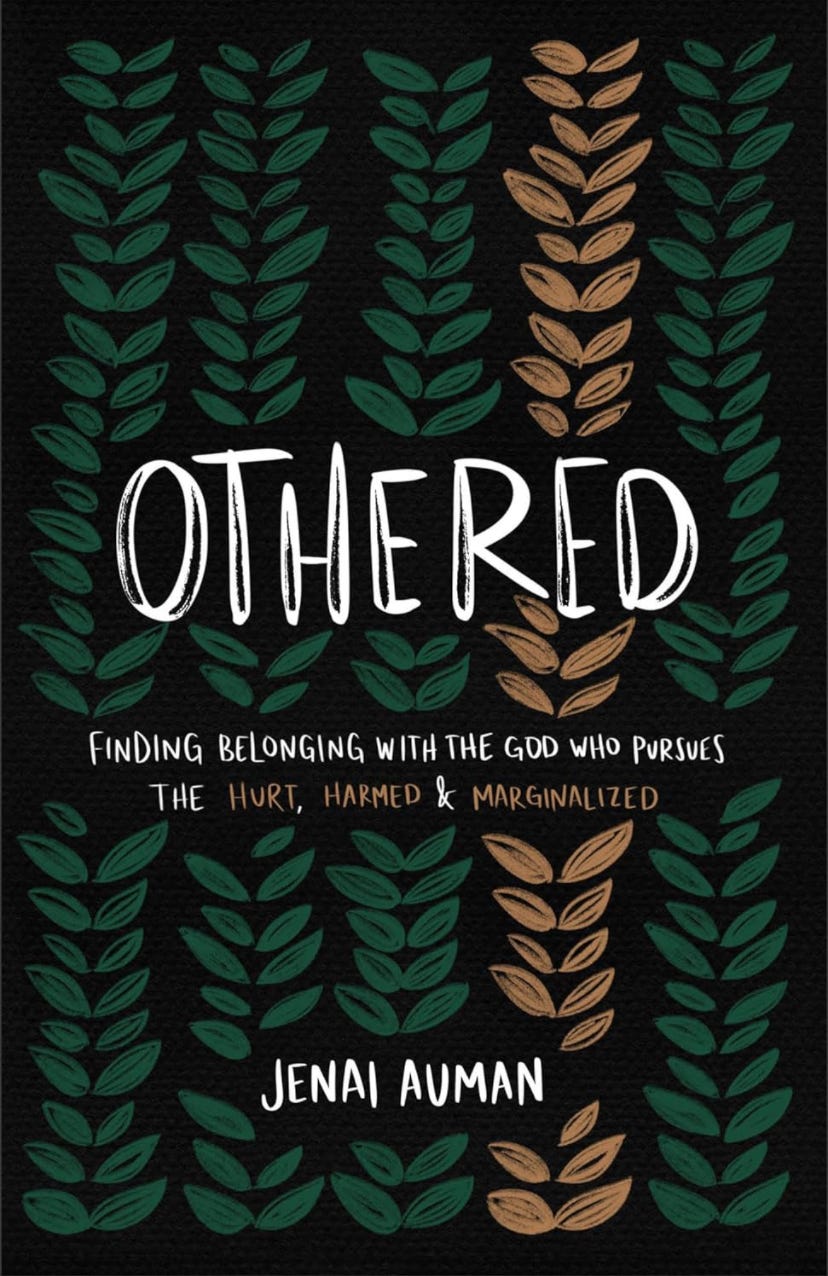Rethinking Faith: Red Flags, Othering, and Sketchy Worship Songs
This month let's explore some red flags and the reasons we ignore them, ponder a book about "othering", and question some sketchy worship songs along with the theology behind them.
Rethinking Faith: June 2024
Welcome to the June issue of Rethinking Faith. This month we will explore some red flags and the reasons we ignore them, ponder “othering” through the new book Othered by Jenai Auman, and question some sketchy worship songs and the theology behind them.
Why Are We So Quick to Ignore Red Flags?
I started down the rabbit hole with a few Google searches and quickly realized that I’d found something far bigger than I could handle late at night or else I wouldn’t be sleeping. A couple of the women in my small group told me about a girl from their old church who had gotten involved with a strange Christian group a few years back and then disappeared.
Elle Christian Roskamp was a student at Grace Bible College (now Grace Christian University) in 2018 when she met a couple, James Cooley and Morgan Wolffis, connected with Burn 24/7 during a ministry fair. She became very close to them and eventually moved in to work as a live-in nanny for their newborn. According to some photos on Elle’s Facebook page, she, James, and Morgan were the leaders of Burn 24/7 West Michigan. It’s interesting to note that Morgan and Elle were similar ages, but James was about ten years older.
During this time, her family and friends noticed some concerning changes in Elle. She began to distance herself, claiming that she knew things about them that had been revealed to her by god during dreams and visions. Elle ultimately cut off all contact with her family and friends and moved to Florida possibly with the couple from Burn 24/7.
According the recent Facebook posts James and Morgan appear to be back in the West Michigan area. Elle’s whereabouts are less certain although she has a YouTube channel where she posts worship songs. As I’ve continued to research James and Morgan, I found a video podcast where they shared their stories. It’s interesting to hear that both of them were new, passionate believers when they were sucked into Burn 24/7. Like Elle, they also sought a real experience with God. The story is devastatingly intriguing. But the more I learn, the more concerned I get.

In my digging, I discovered that one of the founders of Burn 24/7, Sean Feucht, is a former worship leader at Bethel Church in Redding, California. He is still connected to Bethel Music although Sean’s most recent worship album seems to have been produced by himself. This Bethel connection made sense because as I had been scouring the Burn 24/7 website, I came across language that instantly made me think of the NAR, or New Apostolic Reformation. (Find more information on the NAR here.)
Burn has spiritual fathers and mothers that help to keep them faithful and passionate. Many of the people listed under this category are closely connected to the NAR. They talk about sustained night and day worship and prayer as a magic formula that will cause an outpouring of the sustained Presence of God. Burn is very focused on people with apostolic and prophetic gifts; they are looking for spiritual experiences.
I get cold shivers just reading the website and looking into the people involved. At first glance, this appears to be a Christian organization. But as someone with personal cult experience, there are massive red flags.

There is a lot that I could say, and that I might say at a later time, but for the purpose of this letter, I want to focus on four questions:
What are the red flags?
How could Elle, James, and Morgan have missed them?
Why do we as evangelical believers continue to ignore red flags?
What is it that stops us from confronting people?
What are the red flags and how could Elle, James, and Morgan have missed them?
I wasn’t there with Elle as she first experienced Burn 24/7 and the people presenting it. I don’t know how James and Morgan were sucked in. But this reminds me of the emotional and spiritual manipulation of young adults that we’ve been talking about on my podcast and here on Substack. I see the spiritual intensity, religious formulas, and excessive emotions (sentimentalism) on the Burn website and feel instant hesitation. I notice the Christianese phrases that don’t really say anything, the strange word choices like spiritual fathers and mothers, and the bits and pieces of Bible verses scattered to make a specific point, and it all feels familiarly culty to me.
But if you are young, naive, and searching for something, the organization might seem amazing. They appear to be super spiritual with the focus on 24/7 worship and prayer, highly connected to God through prophetic words and visions, and actively advancing God’s kingdom with worldwide “furnaces.” If you watch some of Elle’s YouTube videos, she seems to be completely caught up in what I truly believe is a cult. She is even using the fundie baby voice which tells me that there is a disconnect to her own agency and autonomy. It’s really sad.
The best lies seem true. They are almost true, That is what makes them so dangerous. Which brings me to my next two questions.
Why are evangelicals so bad at catching red flags and why are we often so slow to confront lies and false teachers?
I’m not pretending to have all the answers, but as someone who spent a decade in a Christian cult and has more experience with spiritual abuse at mainstream churches than I want, I see the same thing happening over and over. Many evangelicals don’t want to think bad things about other people. At least not their people. We want the world to be good, idyllic, and safe. So without even consciously realizing it, we pretend that it is. We want happy endings; we are consumed with sentimentalism. So, we bypass, make excuses, and ignore.
There is also a hesitation to judge others for some reason. I don’t feel this myself—trust me, I have no hesitation—but I’ve experienced it from others. When I am pointing out truth about a situation or person, I often get push back. I get excuses. I get reminders to show grace.
Grace is great. I love grace. But we also need truth.
We need to get out of the evangelical fantasy world in our heads that we are trying to create and start speaking truth about the abusers and false teachers in our midst. There, I said it.
There is an epidemic of false teaching ravaging American evangelicalism right now and not enough people are speaking out. Trust me, I will keep speaking out. But if we do not know the truth, if we have not researched, read, and become familiar with solid truth, we can easily get swept up in false teaching. Because, like I said, it sounds really true. And it promises to meet a core need we feel. More on this in the Something I’m Learning section, but first let’s take a quick break and talk about being othered.
“Abusive people within the church garner respect from the majority by virtue of their position or winsome character; their role and the relationships they’ve won protect them from the credible allegations of the unempowered few.”
Jenai Aumen, Othered: Finding Belonging with the God Who Pursues the Hurt, Harmed, and Marginalized
I’m once again enjoying a preview of a soon-to-be-available book thanks to being part of a presale book club. The craziness of the end of school has me behind in the book, but as I finished Chapter One this morning, I found myself so grateful for voices like Jenai’s—voices who are speaking up about the situations and systemic issues in our modern evangelical churches. She starts the introduction with these beautiful and powerful words:
“This book is for the othered. The abused, exiled, excommunicated, scapegoated, and marginalized. The misfits, the grieving, and the angry. The shunned and forsaken. This book is for those pushed out of faith communities and for those on the precipice of making the hard decision to leave.”
I felt these words in the depths of my soul. And a few pages later as Jenai described the God she’s come to know and love, I felt those words just as deeply.
"He seeks not only those who wander off but also those who are pushed out. He continues to seek those cast out of his sanctuaries because the othered bear his image too…This is an invitation to rest and experience the active pursuit of a God who wants you.”
If you have been othered or currently feel othered, I’d encourage you to preorder this beautiful book and let Jenai speak words of truth to your soul. It’s coming June 25th to Amazon and bookstores near you.
Just Because It’s a Worship Song Doesn’t Make It True
I’ve become rather picky about my worship songs in the last year ever since I read Counterfeit Kingdom by Holly Pivec and R. Douglas Geivett and learned more about the New Apostolic Reformation. As I said earlier, Bethel Church in Redding, CA and their Bethel Music label are openly alighted with the NAR and you can hear it in their songs if you are looking. Hillsong and Elevation Worship are also heavily influenced by the NAR if not openly connected.

For instance listen to these lyrics from Build Your Church by Elevation Worship & Maverick City:
Upon this rock, You build Your Church
And the gates of hell will not prevail
When we bind and loose, we proclaim Your truth
And in Jesus' name, we will not fail
At first glance, they may seem biblical. After all isn’t that a quote from Matthew 16:18? The first two lines are from Jesus’ statement to Peter, but the second two lines are straight out of NAR theology which believes that we have the power to bind and loose whatever we want. Look up the words “bind and loose theology in NAR” and you will find a treasure trove of what that phrase actually means.
Or how about these lyrics from Fear is Not My Future also by Maverick City Music:
And if you're ready for a breakthrough
Just open up and just receive
'Cause what He's pouring out
Is nothing, nothing
You've ever seen, you've ever seen
What does it mean to receive a breakthrough? And how do I open up and receive it? This is a Christianese concept centered around the idea of an emotional experience with God that changes your life. I think; I couldn’t find a solid definition. And if you Google “spiritual breakthrough” you will find all kinds of formulas for you to achieve one including a page from Bethel Church in Redding, CA offering the services of Nothing Hidden Ministries.
I’m concerned. I’m concerned with some of the theology we are singing to ourselves while in an emotionally vulnerable state of worship. I’m not trying to be all judgy or legalistic. I’m just trying to be cautious and live with my eyes wide open. And I want you to be aware as well.
I enjoy good worship music, (although not everyone does) but some people LOVE worship music and the worship experience. They love the emotional high they feel and equate it with the Holy Spirit or a connection to God. This was part of Elle (and James and Morgan’s) journey and, according to her YouTube channel, still is. But emotional highs don’t equal the Holy Spirit. As we’ve been talking about for the past few weeks, emotions are an inward bodily response to something that moves outward.
Just because a worship song is popular or makes us feel something, doesn’t make it true. And I think we would do well to be a bit more—okay, a lot more—discerning. I will probably be talking more about this in the coming weeks.
What do you think? Have you noticed any of this in worship songs? What do you think should we do?
As always, I'd love to hear your thoughts, questions, or comments. You can find me on Threads, Instagram, Facebook, my website, and on my podcast Looking for the Real God. I’d love to connect with you on any of these places!
My podcast, Religious Rebels, can be found on YouTube, Apple Podcasts, Spotify, iHeart Radio, and more. New episodes drop every other Sunday at noon on YouTube and 5pm on Substack and everywhere you listen to podcasts.
You can also order an autographed copy of my book, Religious Rebels: Finding Jesus in the Awkward Middle Way by clicking on the button below. Or you can find it on Amazon.









So first, I agree that there are dangerous things about Bethel . But- would ask you to perhaps be open to those of us who are wired to be more emotional, often there is a true spirituality behind it that God works through and uses.
Also the Build Your Church lines are just a progression of that same Scripture- they are the words of Jesus. To Peter, granted- so it’s quite unclear what that means for the rest of us!- but I think there’s room for a good faith argument that binding and loosing is a thing for the church per Matthew 16:19— and no I’m not NAR at all.
As for breakthrough- I agree we can’t make God give us one by just thinking hard about receiving! So I agree those specific lyrics are ehhh. But the longing for breakthrough- for healing, deliverance, freedom from destructive habits, relational repair- is a healthy one, I think. Admitting our complete dependence on God-which is very different than complete dependence on man or on any one church!- is the historic Christian posture that we are meant to lean into in worship, I’d say. And I don’t believe Maverick is NAR associated, but I could be wrong there.. .would love to know.
Fear is not my Future is otherwise a pretty awesome song I’d say. Maybe it’s not a great ‘worship’ song for Sunday morning— but for private listening, I find it edifying and take it as more of a declaration that the Kingdom is both now and not yet, with a big focus on the now- which is extremely Scriptural. Christ really did something on the cross! There are real powers that are no longer ruling in the same way. Hallelujah to that.
Thanks for featuring Othered, Christy! And brilliant write up re: red flags too!